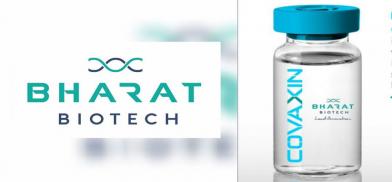India's Bharat Biotech gets permission to manufacture indigenously-developed Covaxin for sale
India's Central Licensing Authority on Sunday granted permission to Hyderabad-based Bharat Biotech to manufacture Covaxin for sale and distribution after the indigenous coronavirus vaccine received regulatory approval for emergency use, IANS said

India's Central Licensing Authority on Sunday granted permission to Hyderabad-based Bharat Biotech to manufacture Covaxin for sale and distribution after the indigenous coronavirus vaccine received regulatory approval for emergency use, IANS said. Bharat Biotech is India's first indigenous vaccine for coronavirus. The inactivated virus vaccine is developed in collaboration with the Indian Council of Medical Research (ICMR) and the National Institute of Virology (NIV).
Earlier on Sunday, Drug Controller General of India (DCGI) V.G. Somani announced that Bharat Biotech's Covaxin has been approved for "restricted use in emergency situation". The approval has also been given to Serum Institute of India's 'Covishield' vaccine.
The Subject Expert Committee of Central Drugs Standards Control Organisation had recommended restricted use of Covaxin "in emergency situation in public interest as an abundant precaution, in clinical trial mode, specially in the context of infection by mutant strains". Officials say that it will be used as a backup in case of a spike in cases.
Covaxin has to be administered in two doses and can be stored at 2-8 degree Celsius. This is a major relief for India which has the second-highest number of infections in the world after the US.
"Covaxin has generated excellent safety data with robust immune responses to multiple viral proteins that persist," Krishna Ella, Chairman and Managing Director of the pharmaceutical firm said
Covaxin is a highly purified and inactivated 2 dose SARS-CoV2 vaccine, manufactured in a Vero cell manufacturing platform with an excellent safety track record of more than 300 million doses, the Hyderabad-based company said in a statement.
"The evaluation of Covaxin has resulted in several unique product characteristics including long term persistence of immune responses to multiple viral proteins, as opposed to only the spike protein, and has demonstrated broad-spectrum neutralising capability with heterologous SARS-CoV2 strains, thus potentially reducing or eliminating escape mutants," it said.
"It has also shown to generate memory T cell responses, for its multiple epitopes, indicating longevity and a rapid antibody response to future infections. Its most critical characteristic is the demonstrated safety profile, which is significantly lower than several other vaccines with published data," it added.
DCGI haf come under flak from various quarters for approving Covaxin even before the completion of Phase 3 trials. Critics wondered how the regulator could approve the vaccine in the absence of the data from Phase 3.
It was in June that Bharat Biotech had announced that it successfully developed Covaxin in collaboration with the ICMR and the NIV.
The SARS-CoV-2 strain was isolated in NIV, Pune and transferred to Bharat Biotech.
The Phase 1 trials began in July while Phase 2 trials started in September.
Sai Prasad, Executive Director, Bharat Biotech had told IANS in November that Covaxin was found to be safe without any major adverse events in the first two stages of the trials.
"We follow a well-designed vaccine development protocol, and ensure each stage of our vaccine development is driven with a sole goal to attain a strong immune response rate in our clinical trials. When we do a trial design, we take into account the attack rates, the disease type, the ability of us to detect the disease and then the recruitment timelines," the official had said when asked about the comparison with vaccines being developed by several companies around the world.
The company has already built capacities to manufacture 200 million doses of vaccine and plan to further enhance to 500 million doses.
It is investing about Rs 350-400 crore for the development of vaccines and the new manufacturing facilities, which includes investments for conducting the Phase 3 trials.
(IANS)








Post a Comment